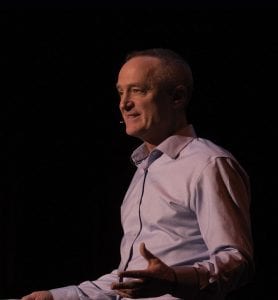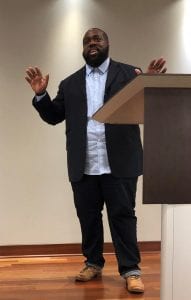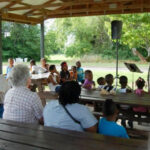If Illinois were your best friend, she’d be asking to borrow some money.
And you’d be wondering what she did with the money you already loaned her.
The state hasn’t had a balanced budget since 2001, every year sliding deeper into debt as it scrambles to cover expensive pension promises to public-sector workers. For nearly 20 years, lawmakers have borrowed and rearranged finances to cover the enormous obligation—the amount needed to pay off promised retirement benefits now stands at more than $200 billion, or about $50,000 from each Illinois household.
At least one pastor is sounding the alarm for what that might mean for churches.
“What worries me is that I think most Illinois churches are unprepared for what will happen—i.e., in an effort to meet pension obligations, legislators will raise taxes and reduce social programming, which will shift the safety net to churches (and other NGOs),” Chicago-area senior pastor Mike Woodruff wrote in an open letter to Illinois pastors this month (full text). “To all of this I add that it seems likely that this will happen during a time when giving to the church is declining.”
It’s hard to see a bright economic future for Illinois, at least before a serious reckoning. Already so many people are leaving (more than 45,000 in 2018 alone) that the trend has been named the “Illinois Exodus.”
That means fewer taxpayers to share the burden, which likely leads to higher taxes, which likely leads to more departures. (This is also a trend in California and New Jersey.)
For churches, that means fewer bodies in the pews, fewer checkbooks opened, fewer staff members employed. And, as Illinois looks at cuts to social programs it already struggles to fund, more people are looking for help.
But that doesn’t mean pastors should be scooting across the border to Wisconsin or Indiana.
“Remember that the months and years ahead will provide a wonderful opportunity for the church of Jesus Christ to proclaim the good news and engage in good works,” Woodruff wrote. “Challenging times are often times of great ministry.”
Illinois or Greece?
Pastors in Illinois are struggling to figure out how to respond to a crisis of this kind.
“The underlying problem is that for several generations, pastors have not seen these issues as something they need to know anything about, so now they’re unable to do much because they don’t know anything,” said Greg Forster, director of the Oikonomia Network at Trinity International University. “We need to play catch-up and fast.”

Three years ago, Woodruff was one of those pastors. Until he ran across an article in the The Economist on Illinois’s pension woes—the magazine ran four that year—and at the same time, happened to glance up at the airport TV screen.
“It was showing rioting in Greece,” he said. “I had an epiphany. I thought, Okay, they’re having riots largely because of pension issues. Oh my goodness, will there be riots in Illinois?”
Of course not, he told himself. Settle down.
But the thought lingered—after all, Chicago isn’t a stranger to riots.
And The Economist itself had drawn the parallel a few months earlier—”Illinois is like Greece in one obvious way: it overpromised and underdelivered on pensions and has little appetite for dealing with the problem . . . Illinois will either sink further into a Greek-style morass of debt or start its long-delayed rehabilitation.”
“I was trying hard not to be a fear-monger, but if there were riots, I had no idea what I’d do,” Woodruff remembers. “If I’m a Christian leader, supposedly part of a societal safety net, I should know what I’d do.”
He started calling his friends, many of whom were pastors at large churches in his area.
“Have you thought about this?” he asked them. “To a person, they said no.”
It wasn’t surprising. Pastors “tend to see people hurting and move in that direction,” Woodruff said. “Anticipating what is coming has not been a strong suit of evangelicals.”
Looking for advice, he picked up books and articles by Martin Luther King Jr. He pulled together a few dozen people to talk about the future. He wrote a book called Future View: Gaining Perspective on the Rising Waves of Change. And he spent three days in Detroit, asking pastors how they managed through that city’s bankruptcy.
“For some people, life goes on as before with just a few new hassles—e.g., the potholes are larger, police response times are slower, and the Department of Motor Vehicles office hours are reduced,” Woodruff explained in his letter. “For others—and here I mean, home and business owners, the poor, students, bond holders, and perhaps public pension holders—the pain is much greater. How a specific church would be affected depends greatly on who attends the church and where it is located.”
“A lot of pastors don’t want to think about it or get very depressed,” he told TGC. “And yes, social programming and stability will go down, and taxes and pensions will go up. But still, it will be better here than in 175 other countries. So don’t panic.”
Don’t panic, but maybe get creative.
Getting Creative
In some parts of Illinois, it’s too late to prepare. Brian Dye, a pastor in Chicago, has been living and working in underresourced neighborhoods for decades.
“The poor and disenfranchised have been here forever, as Jesus promised,” he said. “They have lived in the context of what [Woodruff] is describing as coming in the near future. The church has always been called to use our resources to be a blessing to the poor and disenfranchised.”
Deryk Hayes pastors in Freeport, a town of about 24,000—and dwindling—near the Wisconsin border.

“Many of the parishioners I serve were farmers, or their employment had something to do with farming,” he said. As family farms consolidated into corporate farms, and as factories shut down or moved, the economy in Freeport dried up. Today, the median family income is a little more than $37,000. Nearly 22 percent of people live in poverty.
“The average age of my congregation is 68, so most of them are on Medicaid or Medicare,” Hayes said. “One of the members is in limbo about Medicare and insurance. The state isn’t paying Medicare, and the feds aren’t paying Medicare [during the shutdown], but if he pays his medical bill, it’s considered double-dipping, and his insurance is all out of whack.”
He agrees with Woodruff’s advice to pastors: “Our next steps need to start with prayer and expand into preparation.”
In other words, think like Joseph: When you know lean years are coming, it’s not a bad idea to store up funds—and not just for your own congregants. But don’t save too much, or for too long.
“My main concern is that the problems are so overwhelming and macro in scale that the average pastor will think that there is nothing to do but hunker down, get a handle on the church’s budget, and pray that the state’s disaster days occur after one’s retirement or relocation,” said Bryan Chapell, TGC Council member and pastor of Grace Presbyterian Church in Peoria. “A paradox of sorts is that the more pastors and church leaders are warned of an impending crisis, the more they will turn inward to shore up their own resources, facilities, constituencies, and future.”
Hayes has seen this happen.
“Once you start saving for a rainy day, you don’t realize those rainy days have come,” he said.
He counsels pastors to save 10 percent of their offering and to invest another 10 percent in the community. He also encourages them to think creatively.
“We have a kitchen here that is never used,” he said. “Could we start a café that creates jobs? We also have a gym. Could we start some type of volleyball tournament that can create revenue? We live in a food desert. Could we turn some of our land into an urban farm? Our [parsonage] sits empty, and we have empty classrooms. Could we offer space to entrepreneurs?”
Pastors might also want to think about ways to supplement their income. “Most of the pastors I know in this area are bivocational,” Hayes said.
Woodruff also suggests developing lay leaders and building connections with other church community leaders.
“If things do turn south,” he wrote, “it will be important for churches to help each other and to work hard not to duplicate efforts.”
Called and Burdened
“I’ve always wanted to leave Illinois and move to Texas,” Hayes said. “But when I had an opportunity to either go to Texas or serve this church, I felt called and burdened to serve in this area. . . . You have to be willing to be in those hard places, if those are the hard places God wants you to be.”
He counsels pastors to pray and to lean on God’s providence. “Whether in Illinois or Alaska, he’s going to provide for his servants.”
Whether in Illinois or Alaska, he’s going to provide for his servants.
Woodruff agrees.
“There will be an opportunity for pastors to lead well and offer hope,” he told TGC. “Don’t build barriers and retreat inside and just take care of your own.”
In difficult times, the church has a chance to show generosity, to open doors.
“We can be gracious and loving and cheerful,” which is easier to do when the disaster isn’t a surprise, he said. “I always do better with 10 minutes of advance warning, whatever it is.”
That’s why Woodruff is offering his own warning, “because I would want someone to alert me.”
But he’s also offering encouragement. “Please be reminded that many things are going well, that God remains fully in control, and that his church will prevail,” he wrote. “I have written this because I suspect we are headed into some white water. The waves are going to knock us around a bit. But our foundations are strong.”
Involved in Women’s Ministry? Add This to Your Discipleship Tool Kit.
 We need one another. Yet we don’t always know how to develop deep relationships to help us grow in the Christian life. Younger believers benefit from the guidance and wisdom of more mature saints as their faith deepens. But too often, potential mentors lack clarity and training on how to engage in discipling those they can influence.
We need one another. Yet we don’t always know how to develop deep relationships to help us grow in the Christian life. Younger believers benefit from the guidance and wisdom of more mature saints as their faith deepens. But too often, potential mentors lack clarity and training on how to engage in discipling those they can influence.
Whether you’re longing to find a spiritual mentor or hoping to serve as a guide for someone else, we have a FREE resource to encourage and equip you. In Growing Together: Taking Mentoring Beyond Small Talk and Prayer Requests, Melissa Kruger, TGC’s vice president of discipleship programming, offers encouraging lessons to guide conversations that promote spiritual growth in both the mentee and mentor.

































